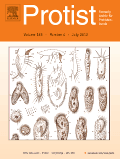
PROTIST
Scope & Guideline
Exploring the Hidden World of Protists
Introduction
Aims and Scopes
- Taxonomy and Systematics:
The journal frequently publishes research on the classification, description, and phylogenetic relationships of various protist taxa, contributing to the understanding of biodiversity and evolutionary history. - Molecular Biology and Genomics:
Research involving molecular techniques, such as DNA sequencing and genomic studies, is a significant focus, providing insights into the genetic diversity and evolutionary dynamics of protists. - Ecology and Environmental Interactions:
The ecological roles of protists in different environments, including their interactions with other organisms and their responses to environmental changes, are central themes in many publications. - Biotechnology and Applied Research:
Several articles explore the biotechnological potential of protists, including their use in biofuels, bioremediation, and as model organisms for cellular and molecular studies. - Morphology and Ultrastructure:
Detailed studies on the morphology and ultrastructure of protists contribute to a deeper understanding of their biology and classification, often employing advanced microscopy techniques.
Trending and Emerging
- DNA Metabarcoding and Biodiversity Assessments:
There is a rising trend in the use of DNA metabarcoding techniques to assess protist biodiversity, which allows for more comprehensive studies of community composition and ecological dynamics. - Host-Pathogen Interactions and Endosymbiosis:
Research focusing on the interactions between protists and their hosts, including endosymbiotic relationships and pathogenicity, is gaining traction, highlighting the ecological and medical significance of these interactions. - Environmental Stress Responses:
Studies investigating how protists respond to environmental stressors, such as pollution and climate change, are increasingly common, reflecting a broader interest in ecological resilience and adaptation. - Single-Cell Genomics:
The application of single-cell genomics to study protists is emerging as a significant trend, providing unprecedented insights into the genetic and functional diversity of these organisms. - Innovative Biotechnological Applications:
Research exploring novel biotechnological applications of protists, such as their roles in carbon capture or as biofertilizers, is on the rise, emphasizing their potential in sustainable practices.
Declining or Waning
- Historical and Biographical Studies:
There has been a noticeable decrease in papers focusing on historical perspectives or biographical accounts of protistologists, suggesting a shift towards more contemporary research themes. - Traditional Morphological Studies:
Research relying solely on classical morphological techniques without molecular support appears to be waning, as the field increasingly emphasizes integrative approaches that combine molecular and morphological data. - Geographical Surveys of Protists:
While geographical surveys have been a staple in protist research, the frequency of such studies seems to be decreasing, possibly due to a growing preference for more focused ecological or molecular investigations.
Similar Journals
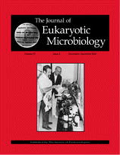
JOURNAL OF EUKARYOTIC MICROBIOLOGY
Bridging Research and Innovation in MicrobiologyJOURNAL OF EUKARYOTIC MICROBIOLOGY, published by WILEY, stands as a vital resource within the field of microbiology since its inception in 1993. With its ISSN 1066-5234 and E-ISSN 1550-7408, this journal provides a platform for the dissemination of high-quality research focused on the biology of eukaryotic microorganisms, including fungi, protozoa, and algae. The journal currently holds a Q3 ranking in the microbiology category, highlighting its significant contribution to scientific discourse in the field. With a multi-disciplinary approach, it encourages submissions that push the boundaries of understanding in areas such as microbiological ecology, phylogenetics, and molecular microbiology. While it does not offer open access, it remains widely accessible to researchers and academics through institutional subscriptions. As the journal progresses towards its converged years ending in 2024, it continues to be a beacon for students, professionals, and researchers alike who seek to explore and advance their understanding of eukaryotic microorganisms.

CONTRIBUTIONS TO ZOOLOGY
Discovering New Horizons in Animal EcologyCONTRIBUTIONS TO ZOOLOGY, published by BRILL, is a premier scholarly journal dedicated to advancing the field of zoological sciences. With an ISSN of 1383-4517 and an E-ISSN of 1875-9866, this journal serves as a vital platform for researchers, professionals, and students seeking to share their findings and insights related to animal science, ecology, evolution, and systematics. Recognized for its high academic standards, it ranks in the top quartile (Q1) for Animal Science and Zoology, and Q2 for Ecology, Evolution, Behavior, and Systematics, reflecting its significance and influence in the scholarly community. The journal has been consistently published since 1994 and continues to contribute pivotal knowledge that informs and shapes contemporary zoological research. Researchers can access the journal through traditional subscription models, ensuring broad dissemination of its impactful articles and studies. Contributions to Zoology plays an essential role in fostering collaboration and discussion within the zoological community in the Netherlands and beyond.

MICROBIOLOGY
Exploring Innovations in Applied MicrobiologyMICROBIOLOGY (ISSN: 0026-2617, E-ISSN: 1608-3237), published by MAIK NAUKA/INTERPERIODICA/SPRINGER, is a pivotal journal in the field of microbiological research, operating from the vibrant hub of New York, United States. With a focus on the intricate relationships and functionalities of microorganisms, MICROBIOLOGY serves as an essential resource for professionals and researchers dedicated to advancing the knowledge of applied microbiology and biotechnology. As of 2023, it holds a competitive Q3 and Q4 category ranking in Applied Microbiology and Biotechnology and Microbiology, respectively, reflecting its commitment to high-quality and impactful research. Although currently not open access, the journal extends comprehensive insights into critical topics that span environmental microbiology, clinical applications, and biotechnology advancements, making it a vital platform for disseminating innovative findings in this ever-evolving discipline. Researchers and students alike will find MICROBIOLOGY to be an invaluable addition to their academic and professional repertoire.
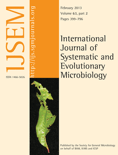
INTERNATIONAL JOURNAL OF SYSTEMATIC AND EVOLUTIONARY MICROBIOLOGY
Innovating Insights into Microbial EvolutionInternational Journal of Systematic and Evolutionary Microbiology, published by the Microbiology Society, stands at the forefront of microbiological research, focusing on the systematic and evolutionary aspects of microorganisms. With its ISSN 1466-5026 and e-ISSN 1466-5034, this prestigious journal not only boasts an impressive impact within its fields—ranked Q1 in both Ecology, Evolution, Behavior and Systematics and Medicine (Miscellaneous), and Q2 in Microbiology for 2023—but also consistently provides an open access platform for researchers to disseminate their findings. Established in 2000, the journal has established itself as an essential resource for professionals and students alike, offering insights into microbial diversity, systematics, and evolutionary pathways. By providing a rich repository of knowledge with a global reach from its UK base, IJSEM continues to enhance our understanding of the microbial world, fostering collaboration and innovation in microbiological science.
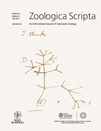
ZOOLOGICA SCRIPTA
Connecting researchers through rigorous peer-reviewed insights.Zoologica Scripta, published by Wiley, stands as a distinguished journal within the fields of Animal Science and Zoology, Ecology, Evolution, Behavior and Systematics, Genetics, and Molecular Biology. With its inception dating back to 1971 and a convergence year extending to 2024, this journal consistently provides a platform for high-quality research, earning a Q1 ranking in two key categories and solid performance in additional fields, as evidenced by its significant Scopus rankings and impressive percentiles. Notably, it ranks 36 out of 490 journals in Animal Science and Zoology, placing it in the 92nd percentile. While Zoologica Scripta operates under a traditional access model, its rigorous peer-review process ensures that only the most impactful studies make their way into its pages. With a focus on advancing our understanding of biodiversity and evolutionary processes, this journal is indispensable for researchers, professionals, and students committed to the ongoing exploration of animal sciences and ecological studies.
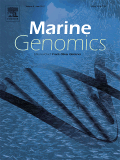
Marine Genomics
Harnessing Genomic Power for Ocean ConservationMarine Genomics, published by Elsevier, is a pivotal journal specializing in the intersection of genomic sciences and aquatic biology. With an ISSN of 1874-7787 and an E-ISSN of 1876-7478, this journal serves as a vital platform for researchers and professionals eager to advance our understanding of marine genetic diversity, evolutionary processes, and biotechnological applications. The journal holds a Q2 ranking in Aquatic Science and a Q3 ranking in Genetics, reflecting its significant contributions to the field alongside its impressive Scopus rankings in both Agricultural and Biological Sciences and Biochemistry, Genetics, and Molecular Biology. As an essential resource for students and academics alike, Marine Genomics is committed to fostering awareness and knowledge of marine ecosystems through quality research disseminated to a global audience. This journal is particularly crucial in an era where understanding aquatic genomics is increasingly vital for conservation efforts and sustainable practices in marine environments.
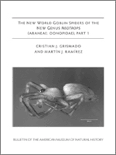
BULLETIN OF THE AMERICAN MUSEUM OF NATURAL HISTORY
Connecting scholars to the latest in natural history advancements.BULLETIN OF THE AMERICAN MUSEUM OF NATURAL HISTORY, published by the American Museum of Natural History, represents a cornerstone of scholarly communication in the fields of Agricultural and Biological Sciences and Ecology. With an impressive impact factor highlighted by its Q1 quartile rankings in both categories, the journal publishes high-quality, peer-reviewed research that significantly contributes to the understanding of natural history. Researchers will find this journal indispensable as it covers a diverse range of topics, providing insights that drive ecological research and biological discovery forward. Although not open access, the Bulletin is widely available through institutional subscriptions, making it accessible to both established professionals and students eager to stay informed about the latest advancements in the field. Its commitment to advancing knowledge from 1996 to the present ensures that it remains relevant and highly regarded within the scientific community.
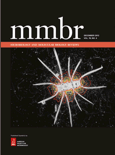
MICROBIOLOGY AND MOLECULAR BIOLOGY REVIEWS
Unraveling Complexities in Microbiology and Molecular BiologyMICROBIOLOGY AND MOLECULAR BIOLOGY REVIEWS, published by the American Society for Microbiology, is a premier journal dedicated to advancing the fields of microbiology and molecular biology. With an impressive impact factor reflective of its Q1 ranking in categories such as Immunology, Infectious Diseases, and Molecular Biology, this journal consistently showcases high-quality, peer-reviewed articles that contribute to the current understanding of microbial life and molecular mechanisms. Operating since 1997, the journal aims to bridge the gap between microbiological methods and molecular biology applications, making it an essential resource for researchers, professionals, and students alike. Readers can access content through various platforms, ensuring that the latest findings are readily available to the scientific community. With its esteemed reputation, MICROBIOLOGY AND MOLECULAR BIOLOGY REVIEWS remains a leading voice in the exploration of the life sciences, catering to a broad audience deeply invested in unraveling the complexities of microbial and molecular systems.

YEAST
Transforming yeast research into impactful biotechnological solutions.YEAST is a renowned peer-reviewed journal published by WILEY, dedicated to advancing the understanding of yeast biology and its applications in various scientific fields. Since its inception in 1985, YEAST has significantly contributed to the disciplines of microbiology, biotechnology, biochemistry, and genetics, achieving respectable rankings within its categories, including Q2 status in Applied Microbiology and Biotechnology and Q2 in Biotechnology as of 2023. With an emphasis on high-quality research, it explores diverse aspects of yeast organisms, from their cellular mechanisms to biotechnological applications. Although it does not currently offer an open-access option, the journal provides valuable insights and findings that are applicable to both academia and industry, making it an essential resource for researchers, professionals, and students interested in the functional and applied dimensions of yeast. With its editorial rigor and commitment to quality, YEAST continues to be a vital platform for disseminating innovative research that shapes future biotechnological advancements.
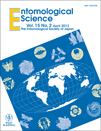
ENTOMOLOGICAL SCIENCE
Advancing Knowledge in Entomological ResearchENTOMOLOGICAL SCIENCE, published by WILEY, stands at the forefront of research in the field of entomology, focusing on the intricate relationships between insects and their environments. With its ISSN 1343-8786 and E-ISSN 1479-8298, this esteemed journal, based in the United States, has been serving the scientific community since 2005. As a Q3 journal in both Ecology, Evolution, Behavior and Systematics and Insect Science, it presents vital peer-reviewed articles that advance our understanding of insects and their ecosystems. With a Scopus rank of 85/181 in Insect Science, the journal not only reinforces the importance of insect study but also serves as an essential resource for researchers and professionals seeking to explore and disseminate knowledge in this dynamic field. Although it does not offer Open Access options, its scholarly contributions are invaluable for those invested in ecological research and entomological perspectives—making it a must-read for aspiring and established scientists alike.